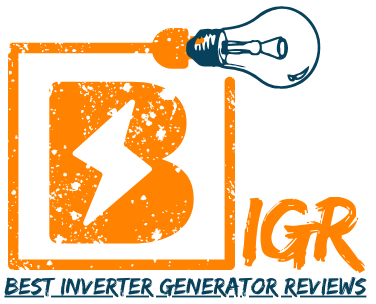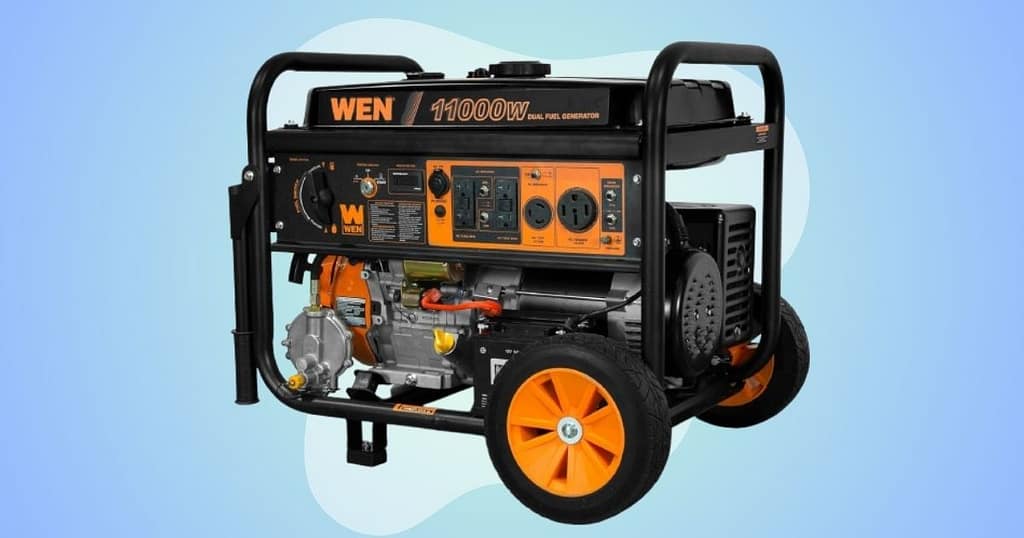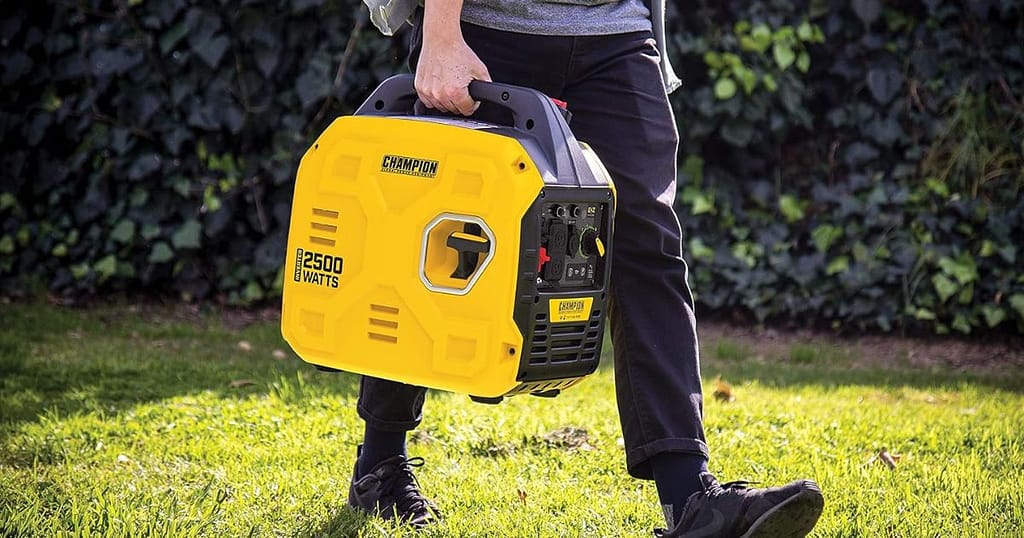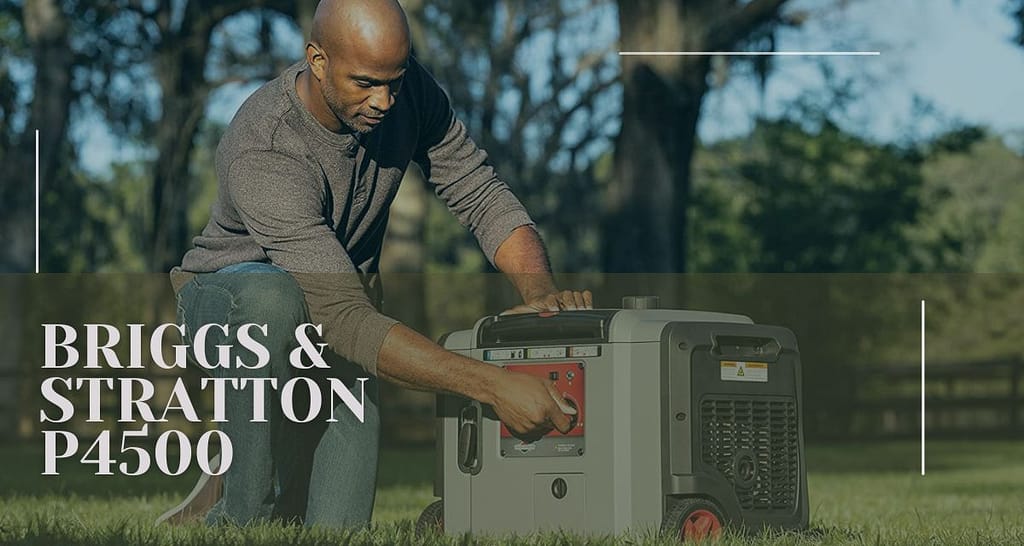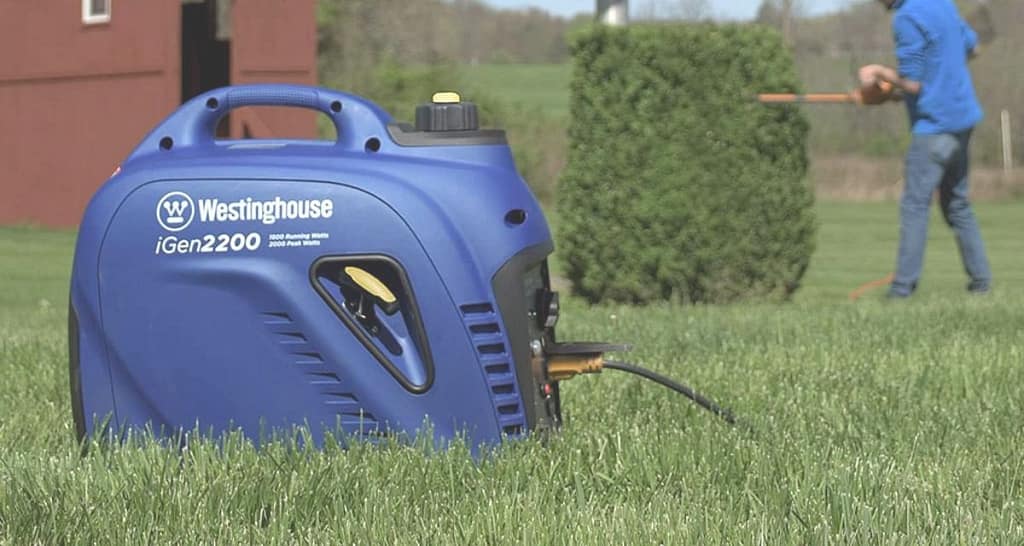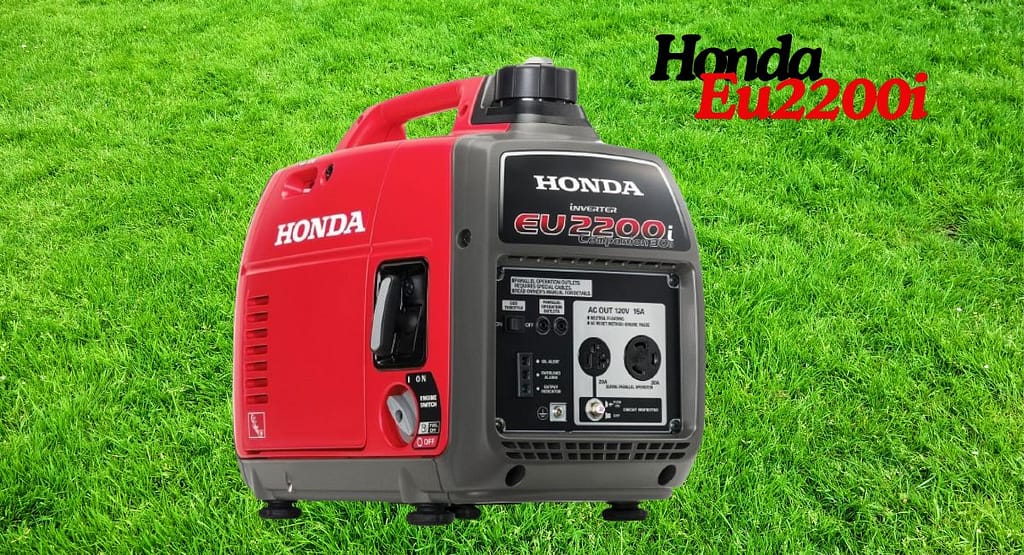When you need serious power for your home, job site, or outdoor adventures, an 11,000-watt generator can be a game-changer. Whether you’re preparing for emergencies, running heavy-duty equipment, or keeping essential appliances on during an outage, a high-wattage generator like the WEN 11000 Watt Generator promises reliability and performance. But does it live up to expectations?
In this review, we’re putting the WEN DF1100T Generator to the test to see how it stacks up against other leading models in its class. We’ll evaluate its power output, fuel efficiency, noise levels, portability, and additional features to help you decide if it’s the right choice for your needs. We’ll also compare it with competitors like the DuroMax XP12000EH, Westinghouse WGen10500TFC, and Westinghouse WGen12000DF to see where it excels—or falls short.
Design and Build Quality
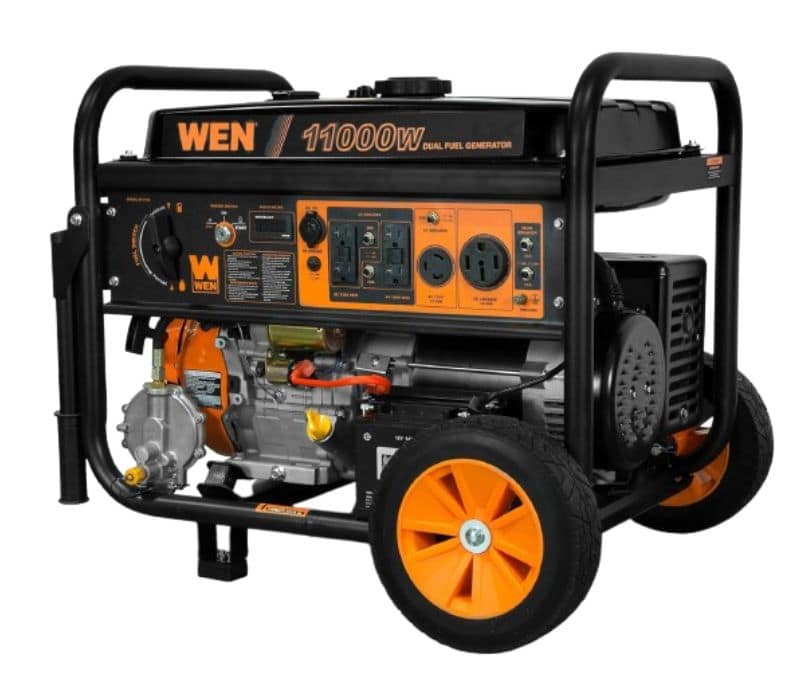
When it comes to the overall design and build quality of the WEN 11,000-Watt Dual Fuel Generator, I have to say—I’m genuinely impressed. Right out of the box, this thing looks and feels like a serious machine. It has a rugged industrial design with a powder-coated steel frame that gives you confidence it can handle rough conditions, whether you’re using it for job sites, backup power at home, or camping trips.
The generator has a compact yet powerful stance. It’s not overly bulky for what it offers, and I found the footprint to be pretty manageable at around 27 by 21 inches. Despite its size and power, it’s been engineered for portability too. The frame includes a collapsible handle and two large, never-flat wheels. These wheels are a lifesaver when you’re trying to move it across uneven ground. I’ve wheeled it through gravel and over curbs, and it held up beautifully—no wobble or tipping.
The control panel is thoughtfully laid out. Everything is right there in front of you—clearly labeled outlets, switches, breakers, and fuel selectors. I didn’t have to fumble around or guess what went where. It feels user-friendly, even for someone who isn’t mechanically inclined. The knobs and ports don’t feel cheap either. They have a good amount of resistance and feel like they’ll last a while.
One thing I really appreciate is the positioning of key components. The oil drain, battery, and fuel selectors are all accessible without having to flip or lift the unit. That tells me WEN really thought about user convenience when designing this.
Even the engine housing and pull-start mechanism feel sturdy. The recoil starter has a solid grip and a smooth pull. I’ve had no issues with loose parts or rattling during operation, which is more than I can say for some other generators I’ve owned.
Engine & Performance
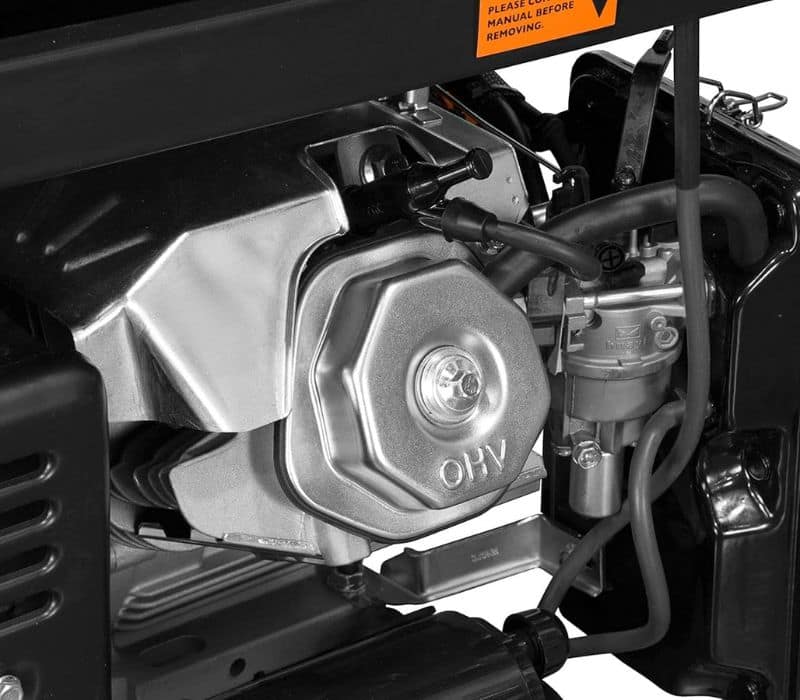
One of the first things I noticed—and appreciated—about the WEN 11,000-watt generator is how easy it is to get going. The electric start is a real game changer. With the turn of a key, the 457cc 4-stroke OHV engine roars to life. No yanking on a recoil cord or second-guessing whether it’s actually going to start in cold weather. It’s smooth, consistent, and surprisingly quiet for something this powerful. I’ve started it on cold mornings, in the rain, even after a few weeks of not using it—and it’s never failed me. That electric start alone adds a level of confidence and convenience that makes the whole experience feel a lot more polished.
As for the engine itself, the 457cc OHV design means it’s built to run cooler and more efficiently. I’ve run this thing for long hours during outages and storms, and it holds steady without showing signs of strain. It’s got a solid cast iron sleeve, which adds durability, and honestly, you can just feel the build quality when it’s running. It’s not the lightest unit in the world, but that’s the trade-off for a dependable powerplant that doesn’t flinch under load.
Now, when I compare it to the Westinghouse WGen12000DF, you can definitely feel the step up in raw muscle. That one’s packing a massive 713cc V-Twin engine, and yeah—it’s a beast. It’s more powerful, no question. The V-Twin design runs a bit smoother at higher loads and has that extra torque if you’re trying to power an entire home or heavier equipment for longer stretches. It also has an electric start with remote start capability, which gives it a slight edge in convenience. I mean, starting it from across the yard is hard to beat.
But here’s the thing—I don’t always need all that extra power. The WEN’s 457cc engine is more than enough for essential household items, tools, and even a few luxury comforts like a portable AC or fridge. It sips fuel more efficiently than the bigger Westinghouse too, especially on propane. So while the WGen12000DF might win the horsepower battle, the WEN holds its own with dependable, no-fuss performance and a really balanced design.
In terms of maintenance, both engines require the usual oil changes and care, but the WEN has been super accessible. The oil drain and filter are easy to get to, and I’ve had no trouble keeping it in good shape. For someone who wants power, ease, and reliability without going overkill, the WEN 457cc engine hits a sweet spot. But if you’re powering a large home, jobsite, or something more demanding, the Westinghouse V-Twin gives you that extra headroom.
Power Output
When it comes to raw power, this WEN generator really doesn’t hold back. Running it on gasoline gives you the full punch—11,000 surge watts and 8,300 running watts. I’ve powered my fridge, a portable AC, lights, a sump pump, and even charged tools all at once, and it didn’t even flinch. That extra surge wattage gives it a nice buffer when certain appliances kick on and draw more power for a few seconds. It keeps things stable and prevents random shutdowns, which I’ve had happen with smaller units in the past.
Switching over to propane is a little more conservative but still very solid. You get 9,500 surge watts and 7,500 running watts. Honestly, I run it on propane most of the time because it’s cleaner, and the wattage is still more than enough for most of my needs. The transition between fuel types is easy, and there’s no noticeable dip in performance when it’s running. I just plan my load slightly more carefully on propane, making sure I’m not pushing it to the edge with everything running at once.
In my experience, the dual-fuel versatility is what really makes these wattage ratings shine. You get flexibility without sacrificing too much performance. On gasoline, it’s a powerhouse. On propane, it’s efficient and dependable. Either way, it gives you serious wattage that’s more than capable of getting through outages or keeping a jobsite humming along without worry.
Fuel Capacity & Runtime
One of the things I really like about this WEN generator is how long it runs on a single tank. With the 6.6-gallon gas tank topped off, I consistently get around 8.5 hours of runtime at half load. That’s more than enough to get through a full day’s work or an overnight power outage without having to stop and refuel. I’ve used it during a storm outage when the power was out all night, and it kept my essentials running without a hiccup.
It’s also pretty efficient for the amount of power it puts out. I’ve had other big generators that burned through fuel faster, but this one feels a bit more refined in that sense. It sips rather than gulps, especially when I’m not maxing it out. I usually plan for refueling in the morning or evening depending on what I’m powering, but I’ve never had to babysit it constantly like some older models I’ve owned.
I haven’t timed it exactly on propane, but it seems to last a little longer per dollar spent, even if the wattage dips slightly. Either way, the 8.5-hour runtime on gasoline has been more than reliable for my day-to-day backup and worksite needs.
Control Panel
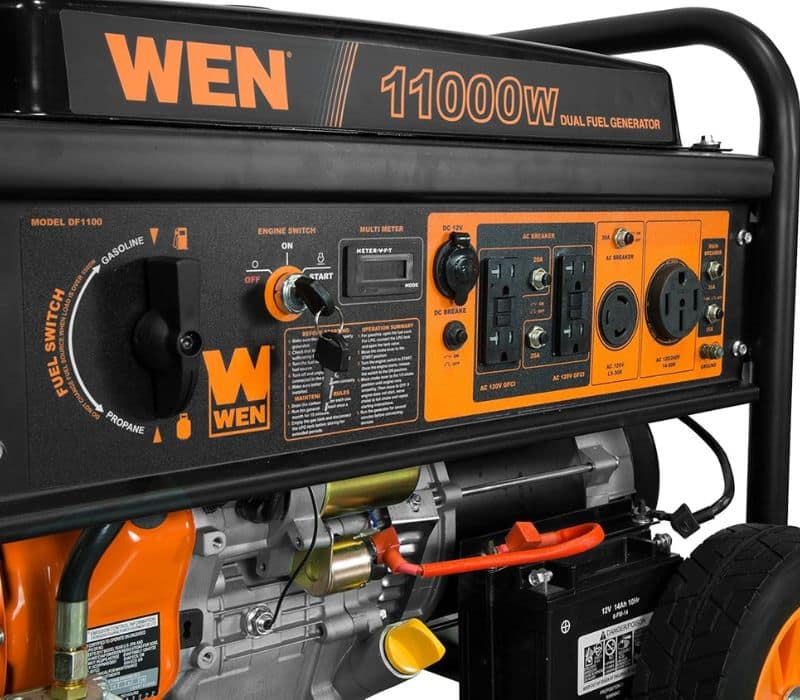
One thing I really appreciate about the WEN 11,000-watt generator is its control panel. It’s simple, straightforward, and honestly just easy to work with—even if you’re not super technical. Everything is spaced out nicely so you’re not fumbling around or hitting the wrong switch. On the far left, there’s a big fuel selector switch that lets you flip between gasoline and propane. It turns with a solid click and doesn’t feel loose or cheap. Right next to it is the engine switch with a key ignition, which gives it a nice secure feel. It starts up reliably, and the key system gives you peace of mind, especially if you don’t want just anyone starting it up.
The digital meter is basic but does the job—it shows voltage, frequency, and runtime, which is all I really need when I’m keeping track of how long it’s been running or making sure power output is stable. The outlets are all clearly labeled, and spaced well enough so I can plug in multiple cords without any hassle. I usually run a mix of household appliances and a sump pump during outages, and everything connects easily. There’s a set of GFCI-protected 120V outlets, a 30-amp twist-lock, a 50-amp outlet for heavy-duty needs, and even a 12V DC plug for smaller charging tasks. All of these outlets have individual breakers, and there’s a main breaker too, which gives you some added peace of mind that nothing’s going to fry if something trips.
Now, when I compare it to the Westinghouse WGen10500TFC, I can definitely see where the Westinghouse pulls ahead in terms of tech and polish. The control panel on the Westinghouse just feels a bit more modern. It’s more compact, has a backlit digital display that’s easier to read at night, and it includes a remote start function that I found incredibly convenient. The WEN has electric start, but with the Westinghouse, I didn’t have to step outside to fire it up—which can be a real luxury during a cold snap or a storm.
Another thing I noticed is that Westinghouse covers its outlets with flip-up rubber covers. That’s something I wish WEN had done, especially since I’ve had to be a bit more careful with rain or dust getting near the panel. I usually just cover mine with a small canopy or tarp if I’m using it outdoors. In terms of ease of use though, I still give WEN some credit. The layout feels less cramped, so if you’re working with gloves on or just trying to move quickly, everything’s easy to grab and see.
Noise Level
Noise-wise, the WEN 11,000-watt generator isn’t exactly whisper-quiet, but that’s expected with a machine this powerful. It runs at around 80 decibels under load, which is about as loud as a vacuum cleaner or a busy street. When I first fired it up, I definitely noticed the noise—but honestly, it’s right in line with what you’d expect from a big open-frame generator like this.
Now, if you compare it to something like the Westinghouse WGen12000DF, which runs at about 74 decibels, the WEN is a bit louder. But in real-world use, that small difference doesn’t feel dramatic unless you’re really sensitive to sound or standing super close. Both of these are workhorse generators, built for power, not silence.
That said, it’s not unbearable. I’ve used it during outages and even for some outdoor work, and as long as it’s not sitting right outside your window, the noise is manageable. If you’re looking for quiet operation, though, this kind of generator probably isn’t the best fit—you’d want to go with an inverter model instead. But for the raw output the WEN gives, I’d say the noise is just part of the package.
Final Verdict
After spending time with the WEN 11,000-watt dual fuel generator, I can confidently say it delivers serious power in a rugged, no-nonsense package. It’s built like a tank, starts easily with the electric key ignition, and gives you the flexibility of running on either gasoline or propane—which is a huge plus during emergencies or fuel shortages. The control panel is well laid out, the runtime is solid (over 8 hours on a full tank at half load), and while it’s not the quietest machine on the block, it’s nothing unexpected for a unit this size.
Compared to others like the Westinghouse WGen10500TFC or even the WGen12000DF, the WEN holds its own. Sure, it might not have the fanciest digital display or quite as many bells and whistles, but it gives you everything you really need—and it’s often priced a bit more affordably, too. That makes it a great value for homeowners, job sites, and even RV setups if you don’t mind the noise.
My Recommendation
If you’re looking for a dependable, high-wattage generator that won’t break the bank, this WEN model is a strong choice. I’d recommend it for anyone who needs reliable backup power for the house or a portable workhorse for tools and equipment. Just make sure you’re okay with the sound level and have space to store a larger unit—it’s heavy and loud, but it works like a champ.
If quiet operation or a lighter frame is more important to you, you might want to look into an inverter generator instead. But if you’re after raw power, durability, and fuel flexibility, this one’s hard to beat.
